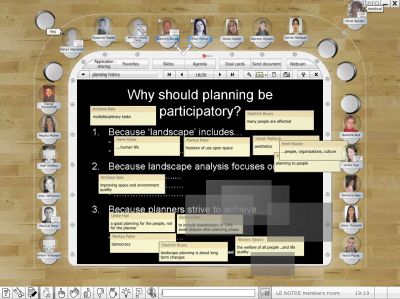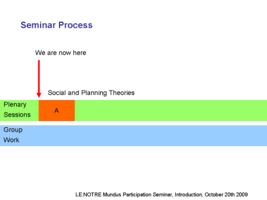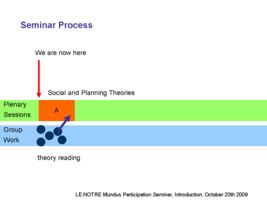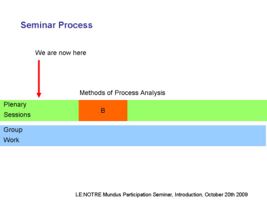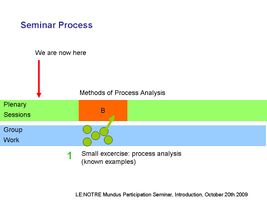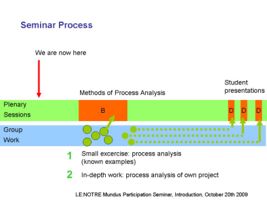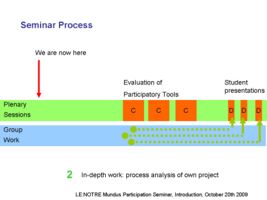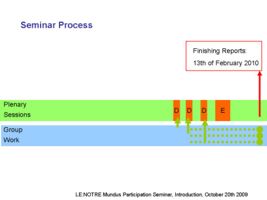Minutes Participation Plenary 1: Difference between revisions
No edit summary |
|||
| (16 intermediate revisions by the same user not shown) | |||
| Line 1: | Line 1: | ||
Unfortunately, we have been facing some technical problems which prevented a big part of the participants from attending the session. But this has been sorted out and will hopefully not occur again, apologies for the inconvenience! Due to the incomplete attendance we could not really do a full round of presentations, so this will be repeated next Tuesday, 27th of October. | Unfortunately, we have been facing some technical problems which prevented a big part of the participants from attending the session. But this has been sorted out and will hopefully not occur again, apologies for the inconvenience! Due to the incomplete attendance we could not really do a full round of presentations, so this will be repeated next Tuesday, 27th of October. | ||
[[Image:Brainstorming participation.jpg|400px|thumb|none|Seminar participants are brainstorming why planning should be participatory]] | |||
=== Lecture on Planning Theory === | |||
The session started with a planning history lecture by Diedrich Bruns, Kassel University, dealing with the change from Rational Planning to Participatory Planning through the so-called ''communicative turn''. Unfortunately, the computer that was supposed to do the session recording broke down after a couple of minutes, which was the other technical problem happening on that evening. However, the slides are downloadable from the password-protected Moodle webpage from the link below, the password has been given to the seminar participants per e-mail. | |||
Diedrich Bruns: [[An introduction to the evolution of participatory planning]] | |||
=== Seminar Process === | |||
In the second part of the session an introduction to the seminar structure and working process was given. | In the second part of the session an introduction to the seminar structure and working process was given. | ||
<gallery caption=" " widths="300px" heights="200px" perrow="3"> | |||
Image:Participation_schedule_2.JPG |The seminar is divided into a series of plenary sessions in VITERO (green) and parallel group work (blue). The first section A is an introduction to the theoretical and methodical background of participation (three sessions). | |||
Image:Participation_schedule_3.JPG |On October 27th we will distribute readings according to the topic map of participation. Individuals or small groups of students will be asked to translate their reading into a concept map and present their finding on the WIKI and to the plenary on the 17th of November. | |||
<gallery caption=" " widths=" | Image:Participation_schedule_4.JPG |In the second thematic section we will deal with methods of process analysis in the context of open space planning. The section start with a theoretical introduction. | ||
Image:Participation_schedule_2.JPG | | Image:Participation_schedule_6.JPG |The first assignment related to this section will be a small exercise in which students are asked to do a small process analysis of an already documented project (examples will be distributed in the session). The results will be presented in the plenary session on 10th of November. | ||
Image:Participation_schedule_3.JPG | | Image:Participation_schedule_8.JPG |After this presentation, the principal assignment of the course will start: preparing a more detailed process analysis with own case studies. The results will be presented during the three last sessions of the seminar in January 2010. | ||
Image:Participation_schedule_4.JPG | | Image:Participation_schedule_9.JPG |In the meanwhile we will have another thematic section (D) which is a series of external experts' reports on their experience with participatory tools. | ||
Image:Participation_schedule_6.JPG | | Image:Participation_schedule_12.JPG |The seminar finishes with a reflection session on what you have experienced on the 26th of January 2010. After this you will be given time for finishing your seminar report until 13th of February 2010. | ||
Image:Participation_schedule_8.JPG | | |||
Image: | |||
Image:Participation_schedule_12.JPG |The | |||
</gallery> | </gallery> | ||
Latest revision as of 07:16, 14 July 2010
Unfortunately, we have been facing some technical problems which prevented a big part of the participants from attending the session. But this has been sorted out and will hopefully not occur again, apologies for the inconvenience! Due to the incomplete attendance we could not really do a full round of presentations, so this will be repeated next Tuesday, 27th of October.
Lecture on Planning Theory
The session started with a planning history lecture by Diedrich Bruns, Kassel University, dealing with the change from Rational Planning to Participatory Planning through the so-called communicative turn. Unfortunately, the computer that was supposed to do the session recording broke down after a couple of minutes, which was the other technical problem happening on that evening. However, the slides are downloadable from the password-protected Moodle webpage from the link below, the password has been given to the seminar participants per e-mail.
Diedrich Bruns: An introduction to the evolution of participatory planning
Seminar Process
In the second part of the session an introduction to the seminar structure and working process was given.
